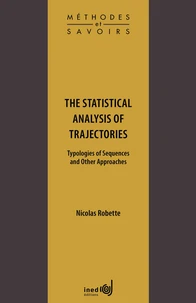- Accueil /
- Nicolas Robette
Nicolas Robette

Dernière sortie
The Statistical Analysis of Trajectories
In recent decades, changes in residential mobility, family structures, education and careers have driven growing interest in the study of life courses in the social sciences. While quantitative life course research generally focuses on events, analysed using event history approaches, the field also aims to understand trajectories as a whole. There are other approaches that allow life courses to be studied holistically, as units of analysis in their own right.
Sequence analysis, the most widely used method, is an invaluable addition to the methodological arsenal of quantitative research, and an essential tool for life course analysis in the social sciences. This practical handbook introduces the reader to sequence analysis and shows how it can be used to build typologies of trajectories. It presents the various decisions involved in its implementation, from data coding to choosing the number of clusters in the typology, and reviews the various ways of measuring similarity between trajectories, a crucial component of the architecture of these methods.
Sequence analysis, the most widely used method, is an invaluable addition to the methodological arsenal of quantitative research, and an essential tool for life course analysis in the social sciences. This practical handbook introduces the reader to sequence analysis and shows how it can be used to build typologies of trajectories. It presents the various decisions involved in its implementation, from data coding to choosing the number of clusters in the typology, and reviews the various ways of measuring similarity between trajectories, a crucial component of the architecture of these methods.
In recent decades, changes in residential mobility, family structures, education and careers have driven growing interest in the study of life courses in the social sciences. While quantitative life course research generally focuses on events, analysed using event history approaches, the field also aims to understand trajectories as a whole. There are other approaches that allow life courses to be studied holistically, as units of analysis in their own right.
Sequence analysis, the most widely used method, is an invaluable addition to the methodological arsenal of quantitative research, and an essential tool for life course analysis in the social sciences. This practical handbook introduces the reader to sequence analysis and shows how it can be used to build typologies of trajectories. It presents the various decisions involved in its implementation, from data coding to choosing the number of clusters in the typology, and reviews the various ways of measuring similarity between trajectories, a crucial component of the architecture of these methods.
Sequence analysis, the most widely used method, is an invaluable addition to the methodological arsenal of quantitative research, and an essential tool for life course analysis in the social sciences. This practical handbook introduces the reader to sequence analysis and shows how it can be used to build typologies of trajectories. It presents the various decisions involved in its implementation, from data coding to choosing the number of clusters in the typology, and reviews the various ways of measuring similarity between trajectories, a crucial component of the architecture of these methods.
Les livres de Nicolas Robette

L'analyse statistique des trajectoires. Typologies de séquences et autres approches
Nicolas Robette
E-book
3,99 €

L'analyse statistique des trajectoires. Typologies de séquences et autres approches
Nicolas Robette
Grand Format
7,00 €
